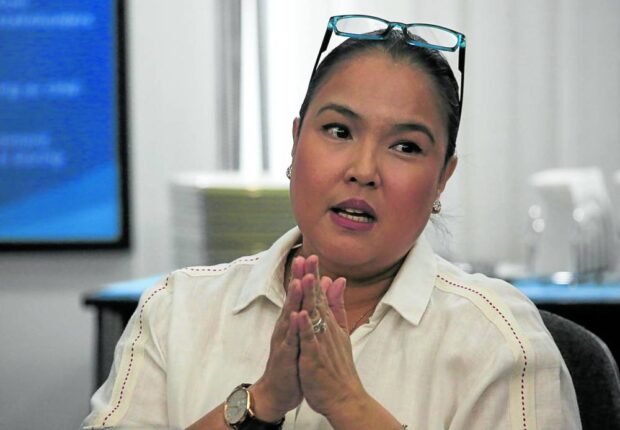
NGCP assistant vice president Cynthia Alabanza (INQUIRER FILE PHOTO)
MANILA, Philippines — The privately owned National Grid Corp. of the Philippines (NGCP) has been earning billions of pesos that go to its shareholders as dividends instead of being spent for transmission projects that it had failed to deliver, an inequitable practice that senators on Wednesday said the Energy Regulatory Commission (ERC) should switch off at once.
“The Filipino people have been had,” Sen. Raffy Tulfo said at the resumption of the Senate energy committee’s inquiry into NGCP’s operations.
“You’re worse than Judas. You have already divided the (silver coins) even before the projects have been finished,” he told officials of the country’s sole power grid operator. “Have some shame!”
Responding to a query from Sen. Sherwin Gatchalian, NGCP assistant vice president Cynthia Alabanza also admitted that they had been charging electric consumers for the expansion and development projects that have not been completed.
Citing data from the ERC, Gatchalian said NGCP has yet to accomplish dozens of projects, among them the full interconnection of the Visayas-Mindanao grids that should have been finished in 2019.
“This is really a super profitable business. We’re being cooked in our own lard,” Gatchalian said, adding that the project delays adversely affected the country’s energy security.
Alabanza could not say how much NGCP had collected from consumers and if the cost for these projects had actually been added as part of the transmission charge.
The generation charge, or the cost of purchased electricity from suppliers, accounts for 55 percent of a customer’s total monthly Meralco bill, while the transmission charge, or the cost of electricity delivery to the Meralco system, makes up 10.1 percent.
Alabanza also apologized for the delays in the completion of the projects, many of which, she claimed, were affected by issues involving road right-of-way.
“We may sound to be making excuses, but the reality is we do suffer from both external and internal delays,” the NGCP official explained.
Surprised at what he heard, Tulfo asked ERC Chair Monalisa Dimalanta if collecting fees for unfinished projects was allowed under the law.
“Unfortunately,” Dimalanta replied, “under the (ERC) order issued in 2020, they are allowed to do it.”
Dimalanta was referring to the interim Maximum Annual Revenue, which authorized NGCP to increase its income ceiling from P43 billion in 2019 to P47.1 billion in 2020.
Visibly irked, Tulfo retorted: “Why did you allow it, ERC? You have the power to stop it!”
The senator was further incensed when Sen. Risa Hontiveros pointed out that the fees for the unfinished projects had been shared as dividends to NGCP’s stockholders.
NGCP, which has a 25-year concession contract and a 50-year franchise to operate the country’s lone power grid, is 40 percent owned by the State Grid Corp. of China (SGCC).
The remaining 60 percent is equally divided between tycoon Henry Sy Jr.’s Monte Oro Grid Resources Corp. and businessman Robert Coyiuto Jr.’s Calaca High Power Corp.
“Why is NGCP being given so many special treatments? What’s so special about these people?” he asked. “Why are you allowing this?”
Tulfo then quizzed NGCP assistant corporate secretary Ronald Dylan Concepcion about the consortium’s annual profits, which the senator had previously claimed were almost entirely declared as dividends to its shareholders.
According to Concepcion, the consortium raked in more than P20 billion in 2019, and distributed P15 billion of this to its shareholders, while it spent P39 billion for capital outlay.
“There you go. That means 75 percent (of the income) went as dividends,” Tulfo remarked. “It’s only in the Philippines that (electricity) transmission is being used for profits.”
Concepcion also disclosed that NGCP shared among its owners P19 billion out of its earnings of P20.6 billion in 2017, and another P21 billion from its income of P22.5 billion in 2015.
In 2014, he said the consortium distributed P24 billion to its shareholders after declaring a net income of P22 billion.
“So your net income was negative? I pity you,” Tulfo quipped, referring to the bigger dividend than the net profit for the year.
Alabanza quickly explained that the dividends were actually taken from “retained earnings which have accumulated over the years.”
“So (dividends) declared for these years does not necessarily come solely from the profits earned for that particular year,” Alabanza explained.
Filipinos in control
The discussion had veered away from the senators’ earlier call to oust the Chinese investor in NGCP, warning that SGCC’s presence compromised the country’s power grid.
In a statement sent to reporters on Wednesday, however, NGCP insisted that Filipino shareholders remain in control of the company, and noted that SGCC’s 40-percent stake “fully complies with the Constitution” as the law allows foreign ownership of up to 40 percent of the capital stock of a corporation operating a public utility.
“State Grid’s stake cannot and does not amount to control of the company because Filipinos own 60 percent of NGCP,” NGCP said.
NGCP likewise noted that SGCC, as a foreign member of the consortium that won competitive public bidding, had the international experience and expertise needed to maintain the power grid.
Under Republic Act No. 9136, or the Electric Power Industry Reform Act (Epira) of 2001, a concession contract may only be awarded to a private entity “with proven domestic and/or international experience and expertise as a leading transmission system operator.”
NGCP noted that at the time the law was passed, there were no Philippine corporations that met the qualifications stipulated in the Epira.
“This experience and expertise would necessarily come from a foreign partner. Foreign participation was therefore expressly recognized and even required by the Epira,” NGCP said.
“It was State Grid … which provided this required international experience and expertise to NGCP,” it added.
NGCP added that its control centers, substations, and command centers were all operated and manned by Filipinos.
“There is no danger of any foreigner directly controlling, or interfering with, the operations of the grid,” it said.

